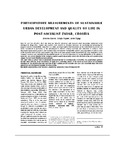Participatory measurements of sustainable urban development and quality of life in post-socialist Zadar, Croatia

View/
Date
2008Author
Cavrić, B.I.
Toplek, S.
Šiljeg, A.
Publisher
ClanakType
Published ArticleMetadata
Show full item recordAbstract
Over the last two decades, there has been an intensive discourse and research about measuring sustainable urban development. Many cities, regions and countries have decided to introduce indicators for monitoring and measuring the progress towards sustainability. Today there is a wide spread perception that information on the environment in general, and urban environment in particular, is the determinant of effective rational decisions and allocation of resources. Such information would enable planners and decision makers to formulate redistributive policies and programmes to address some of the disparities that exist in a post-socialist city. Cities of the post-socialist world characterized by sharp disparities, socio-economic contrasts and environmental degradation provide an excellent laboratory for tracing information on the quality of urban life. The current situation in the emerging Croatian coastal city of Zadar reflects the diversity of the post-socialist urban change in a very fragile Mediterranean landscape. This paper takes a critical look at sustainable development and its measurements. It describes the participatory approach through which different local communities in Zadar were evaluating quality of life based on basic pillars of sustainable development. The identification and collection of their opinions provide valuable data base and community input into urban governance and development planning decision making.
